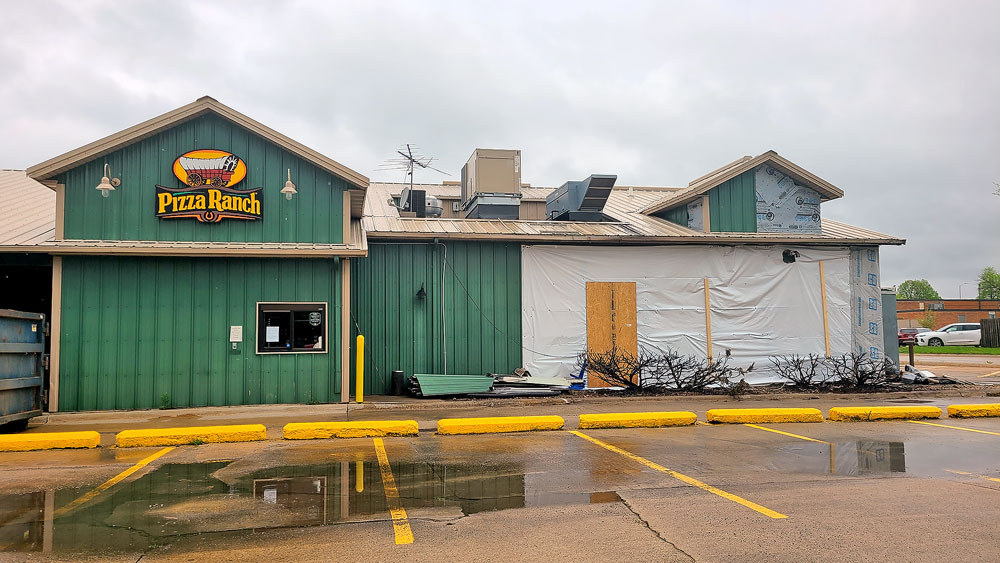McQuillen Place project finish in sight? Maybe

By Bob Steenson, bsteenson@charlescitypress.com
A decision by a judge in federal court to move the McQuillen Place Co. bankruptcy from Chapter 11 to Chapter 7 could mean the Main Street property is sold in the next couple of months and work could begin to complete the residential and retail project that has been sitting unfinished since 2017.
Or it might mean further legal entanglements and delays ahead. It all depends on who you ask.
Last week, Bankruptcy Judge Thad Collins, in the U.S. Bankruptcy Court for the Northern District of Iowa, ruled in favor of a motion by First Security Bank and Trust and against Charles Thomson, the majority owner for McQuillen Place Co., to convert the bankruptcy to Chapter 7.
Under Chapter 7, a trustee is assigned to liquidate the assets of the business, selling them off to raise as much money as possible to pay the people who are creditors — the people and businesses that say the business owes them money.
Kurt Herbrechtsmeyer, the president and CEO of First Security Bank and Trust, told the Press this week that the judge’s decision should mean the McQuillen project will be completed, possibly in the next year or so.
“The good news about the Chapter 7 and the reason we think it’s good for us and for Charles City is that it gets McQuillen Place in particular sold to another developer to complete,” Herbrechtsmeyer said. “That should happen early in 2020. There’s no reason that shouldn’t happen.”
But Thomson said a sale through the bankruptcy trustee assigned to the case is not inevitable.
“Any sale, whether it’s under 7 or 11, has to protect the rights of the parties with interests in the building,” Thomson said.
“First Security Bank claims rights in the building which we have challenged. We claim rights in the building which First Security Bank has challenged. If the parties with rights in the building do not consent to a proposed sale, the building can only be sold free and clear of those claims if a specific set of rules and procedures are followed,” he said.
“I believe that the present set of circumstances will make it very difficult for the building to be sold through the Chapter 7 process, but it’s not impossible,” Thomson said.
In March 2018, Cedar Rapids Bank and Trust, the original holder of the note for the construction loan on the project, had filed for foreclosure, saying the note was in default for lack of payments and that more than $4 million in principal, interest and late charges was owed.
In August 2018, First Security Bank and Trust of Charles City was named the plaintiff in the foreclosure after the Cedar Rapids bank assigned its claims to First Security.
The foreclosure action was stayed when Thomson filed for Chapter 11 bankruptcy in April this year for McQuillen Place Co. LLC, the company that owns the McQuillen Place property as well as Classic Cleaners in Charles City.
Chapter 11 gives a business time to reorganize and restructure its debts and assets with the hope of retaining control and continuing on with a fresh start.
However, First Security Bank filed in November to dismiss the bankruptcy or convert it to Chapter 7, arguing that a reorganization plan filed by Thomson was not made in good faith and that the amount owed to First Security was more than the current value of the unfinished McQuillen property.
It also pointed to unpaid property taxes that the bank had covered and to what it called the deteriorating condition of the property.
Thomson, a Charles City attorney and developer who also practices in Chicago, had resisted the bank’s motion.
“I believe that moving this case from Chapter 11 to Chapter 7 will most likely delay completion of the building rather than expedite it,” Thomson told the Press Thursday regarding the judge’s decision.
Throughout the long and very complicated legal process that has swirled around the McQuillen project, numerous suits and motions have been filed by various parties involved.
Thomson has also filed a suit in state court against the Iowa Economic Development Authority (IEDA), claiming that special state tax credits that the project had qualified for and that Thomson was counting on to complete the project were not granted by the state.
The IEDA said Thomson had missed the two-year completion deadline required in the tax credit rules. At that point the project had been going on for four years and was not yet finished.
Thomson has also filed lawsuits against First Security Bank and particularly against three of its directors, for “tortuous interference,” arguing that they did not represent his interests and that they acted directly to interfere with his ability to finish the project or to get other financing, so that the bank could rescue the project and look like a “hero” in the community.
The bank and the bank directors — Kurt Herbrechtsmeyer, Richard Herbrechtsmeyer and Gene Hall — have denied the claims.
“I probably should not at this point make any comments about that,” Kurt Herbrechtsmeyer said. “There’s still a lot of other moving parts with the financing of this whole project, with the other collateral and the other entities, and so that all wraps up into a fairly complicated knot at this point that will have to unwind separately.”
(Editor’s note: Gene Hall is a former owner of the Charles City Press. His son, Christopher Hall, is now the publisher and Christopher and his wife are the owners.)
Thomson said he hopes the project gets moving, but he is skeptical the ruling to convert to Chapter 7 bankruptcy will hurry it along.
“I have one, singular thing I’d like to achieve, and that’s to get this project done, for the people of Charles City,” Thomson said. “My goal in all of this isn’t necessarily to maintain control of the building no matter what. My goal is to get the building completed properly as quickly as possible.
“If someone else shows up and can do the job satisfactorily, I won’t put a pebble in their path and, in fact, I’ll help them as much as I can,” he said. “That’s why I’ve worked with several groups interested in buying the building and finishing it. They have spent many hours studying the building, its drawings, and all the financial data and I’m happy to help them. And that’s also why I’m very frustrated that the bank has been remarkably disinterested in working with us on this process.”
Herbrechtsmeyer said the IEDA has been in contact with several potential developers about taking over the project through a Chapter 7 sale, and the bank has heard from interested developers as well.
He said it is possible that incentives may be available again to get the project moving.
The IEDA had originally provided almost $3 million in a forgivable grant in return for a percentage of the apartments in the project being available at a subsidized rate.
Herbrechtsmeyer said the state may be interested in being a partner again.
The city of Charles City had also originally agreed to provide a $900,000 loan to the property and to rebate 90% of additional property taxes for 15 years through tax increment financing (TIF). Neither of those financing arrangements has been used because the project was not completed.
Herbrechtsmeyer said the Chapter 7 decision is significant.
“Absolutely,” he said. “The other option was for this to wait for all of the rest of that (the lawsuits and foreclosure) to play out, and that could have been several years while nothing happens in that building, most likely. That was part of the reason for the judge’s ruling to move this to the 7. That property was not going to be well-served sitting there empty.”
Herbrechtsmeyer said the bankruptcy trustee is working on finding a manager for the project to make sure it will be heated and taken care of through the winter. He said the cost for that will likely fall to the bank.
“I don’t think they’re looking at anyone else. We’re the secured creditor. We’re the one that has most to lose in terms of total dollars, so it makes sense that the property taxes, insurance and maintenance falls to us,” he said.
Thomson said he has a lot of respect for Collins, the bankruptcy judge, and can understand why he made the decision he did.
“I can understand completely why he believes that there’s a chance that a Chapter 7 trustee might be able to move this along more quickly than the other options available. After all, the new trustee is fresh to the case and is a neutral outsider,” Thomson said. As such, he will have a greater level of credibility in trying to craft a compromise than any of the other litigants have had.
“In particular, I am hopeful that he will be able to get the bank to see that they have treated their borrower in this case very badly, that they have real liability here, and that getting a reputation for treating borrowers badly is not good for business,” Thomson said.
The McQuillen Place project was announced in January 2013 as a 50,000-square-foot collection of retail stores and apartments with a total price tag that has been variously listed as between $8.6 million and $13 million.
The project was announced by brothers Charles and Peter Thomson, who jointly operate Amelia Management, a Charles City-based real estate development company. Another brother, Steven, was also a partner. Steven died in 2017.
The proposal was for a Victorian-style building to be constructed on nine lots in downtown Charles City that had been vacant for more than 20 years, with 33 apartments on the second and third floors of the building and a row of up to eight retail stores on the ground level along Main and Clark streets.
After construction on the McQuillen project stalled in 2016, work picked up again for a while in the summer of 2017 as finishing on the outside of the building resumed and a clock tower was installed on the corner of the building, but construction soon stalled again.









Social Share